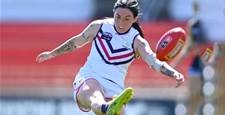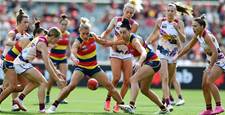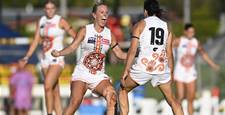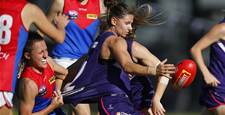Dreams, injuries, resilience and legacies.
Injury. So often a part of sport, professional or otherwise and almost always challenging.
Matilda, Kyah Simon, has had more than her fair share, but her physical and mental resilience shines through in her relentless goal to be ready for the World Cup in France 2019. It’s bigger than a goal. It’s a dream.
“What makes a Matilda initially is a dream. It’s when you set a dream as a young girl playing a sport just for fun," she said.
“For me, and a lot of the girls in the Matildas' jersey now, it’s a childhood dream that we wanted to achieve at some point in our in our lives. When that dream comes true, it's just an absolute honour and a privilege to represent our country at the highest levels in the World Cup and Olympic Games.
“Something that started out as just a passion and a love for the game, has turned into a full-time profession, an opportunity to live out our dreams and to be the best female footballers and role models as well."
Simon fully appreciates those who came before her, who paved the way for the Matildas of today and tomorrow.
“Every member of the Matildas, from cap one [Julie Dolan] all the way up to cap 202 [Mary Fowler] has given something to football," she said.
“I was lucky enough to come in 11 years ago into the Matildas [cap 157] and be a part of an era with Cheryl Salisbury and Di Alagich. That was really eye-opening for me as a 16 year old and be playing with amazing role models and the most amazing footballers as well."
For Simon, to see where the game was back then, to where it is now, it’s humbling.
“I'm really grateful for what they've done for the sport. It wouldn't be in the position that it is and for all the fights that they had to go through. They were really the pioneers of the sport. And we're starting to reap some of those benefits of being a part of the legacy that they left. It's up to us now to take that forward, to leave a legacy and be pioneers for the next generations to come through."
A legacy which sees the Matildas currently ranked sixth in the world in a sport which is the most popular team participation sport for kids in Australia. Simon’s legacy is part of that, but it’s also something bigger.
“I think I'd be downplaying if I said I have had it easy throughout my career. At 27 years of age, I've had my fair share of injuries and setbacks. Four major surgeries, so I have definitely had a bad run over the last three or four years.”
“The legacy I want to leave is to be a positive role model for young girls out there. But also, to set an example that it's not always rainbows and butterflies.
“It's sometimes hard, and you're in some of the biggest lows of your life. But I think when you look back to where you are, playing for your country at a World Cup and an Olympic Games, all of that sacrifice and hard work, it's all worthwhile and it takes a little resilience to get through setbacks and injuries.
“That's the biggest legacy that I want to leave. I just want to be an example that even if you have setbacks, that you can bounce back, and it's up to you, as an individual to get yourself back and believe in yourself at the end of the day.”
Alongside injuries, Simon reflects that it’s also challenging as a female footballer.
“It's mentally tough. Seeing the game of where it was, and where it has come to, you start to realise that it's not the norm to be underpaid, and there's not that equality.
“I think the game is moving in the right direction, but there is a lot of progression still to be made.
“I touched on the Chezza's [Cheryl Salisbury] and players of that era and what they went through to just represent their country, having to pay their own airfares to get anywhere, and that makes me grateful for what we have.
“At the end of the day, I want to get to a point where footballers only have to worry about football, be a professional athlete, and get remunerated for exactly the amount of hours and time and sacrifice that they've put in.”
Injuries and setbacks don’t define Simon’s career. There’s more to her journey and the legacy she is shaping as one of a few indigenous players to wear the Matildas' cap.
“My aboriginal culture and heritage is something that I'm so privileged and proud to have in my blood.”
“Being the first indigenous male or female to score at a World Cup is an honour for me.
“I speak a lot about being a positive role model for all young girls out there, but especially in the indigenous community when opportunity sometimes is scarce or not as great as in the big cities.
“My message to young indigenous kids is really just to make the most of what you have.
“My parents came from a pretty rough background themselves. They came from very tough childhoods to where they are now and brought us four kids up. You're only as good as what you make of the opportunities that you work for, and that you give yourself."
It’s now a race for Simon to complete her rehab and hope her hunger for selection is rewarded. It’s not an easy challenge, with a new coach and healthy competition for a spot in the squad.
“I'm yet to be a part of the squad due to rehabbing my ankle, but I think it’s only going to bring the best out of everyone and the best out of the team having that positive competition between one another vying for spots.
“No one is in a comfort zone and I think that really brings out the best in anyone's performance. It's up to us as players to rise to the occasion and to go out there and prove ourselves that we should get on the plane to France.
“I have so much confidence and belief in our whole squad. It takes every individual to be a part of the team to make it a successful collective team and I will give myself the best opportunity to be on the plane to France.”
Related Articles
.jpg&h=172&w=306&c=1&s=1)
Matildas' Kyah Simon among four to depart ALW Mariners
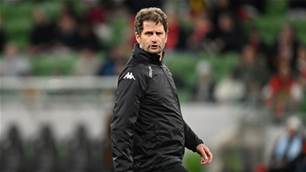
'Timing not right': Montemurro's verdict on Matildas vacancy
.jpg&h=172&w=306&c=1&s=1)
.png&h=600&w=850&c=0&s=1)




